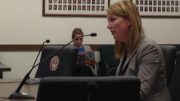Update: Gov. Jared Polis signed HB 21-1025 into law on Wednesday, Apr. 7.
By Jeffrey A. Roberts
CFOIC Executive Director
Elected officials could exchange scheduling emails and other messages that do not concern the “merits or substance” of public business — without worrying about violating the state’s Sunshine Law — under a measure advanced Monday by a Colorado House committee.
House Bill 21-1025 would amend the Colorado Open Meetings Law to clarify that elected officials’ electronic communications regarding their availability to meet would not be considered “meetings” subject to the law and its notice requirements. The same would be true for messages that forward information, pose questions for future discussions, or respond to inquiries from constituents and other people who aren’t members of an elected board.

“This is a good governance bill and a deregulation bill,” said Rep. Jeni Arndt, the Fort Collins Democrat who introduced the legislation. “… I don’t think the people of Colorado want us to schedule a meeting to be able to schedule a meeting. That doesn’t seem like the right way to proceed in government.”
The open meetings law declares that meetings of a public body, whether held in person or electronically, are open to the public at all times if public business is discussed or formal action may occur. For a local public body, a quorum or three or more members — whichever is fewer — must be in attendance to make the meeting open. For a state public body, it’s two or more members.
The law already says that email communications among elected officials that are unrelated to “pending legislation or other public business” are not “meetings” for purposes of the law. But Heather Stauffer, a lobbyist for the Colorado Municipal League, said elected officials often seek guidance about whether they are permitted to send emails about non-substantive matters.
“I think it’s important to note that the bill doesn’t change any requirements we have under the open meetings law when it comes to communications between elected officials that relate specifically to the merits or substance of either pending legislation or other public business,” she said.
The bill, Stauffer also noted, would not affect the availability of elected officials’ emails under the Colorado Open Records Act.
Amanda Gonzalez, executive director of Colorado Common Cause, testified against HB 21-1025. “We’re worried that this bill could unnecessarily limit public access to important information about how the government is run,” she said. “We appreciate the intent of modernizing our laws but worried there might be some confusion here.”
CORA requests sometimes reveal that multiple members of a public body have discussed public business via emails or text messages. Last month, a text message thread obtained by the Loveland Reporter-Herald showed Loveland City Council members discussing a proposed ban on flavored tobacco and vaping products.
The House State, Civic, Military and Veterans Affairs Committee passed HB 21-1025 on a 9-2 vote. Rep. Dave Williams, R-Colorado Springs, said he voted no because he would like to see a narrow definition in the bill of the phrase “merits or substance of pending legislation or public business.”
Follow the Colorado Freedom of Information Coalition on Twitter @CoFOIC. Like CFOIC’s Facebook page. Do you appreciate the information and resources provided by CFOIC? Please consider making a tax-deductible donation.




